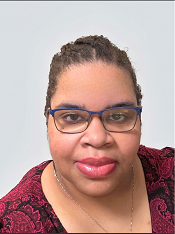Office of Research & Development |
 |

January 26, 2024
By Erica Sprey
VA Research Communications

VA researcher Dr. Geneva Wilson studies infection prevention and antibiotic stewardship to help prevent diseases like MRSA and C. Diff in Veterans.
Dr. Geneva Wilson is an epidemiologist and researcher with the VA Center of Innovation for Complex Chronic Healthcare (CINCCH) in Hines, Illinois, located outside of Chicago. There, she studies infection prevention, implementation science, and antibiotic stewardship to help prevent diseases like methicillin-resistant Staphylococcus aureus (MRSA) and Clostridioides difficle (C. Diff) in Veterans and others.
Wilson took her first epidemiology course as an undergrad and fell in love with the discipline. “My professor told me that epidemiology is the study of cause and effect. It was a synthesis of what I loved about science, what scientific exploration meant to me,” said Wilson. She earned her PhD at the University of Iowa and started working for VA just six months before COVID-19 necessitated widespread telework.
As a VA Diversity Equity and Inclusion Supplement awardee, Wilson teamed up with Dr. Charlesnika T. Evans at CINCCH and Dr. Robin Jump at the Pittsburgh VA. Their project is called “Dissemination and Implementation of a Videoconference Antimicrobial Stewardship Team” or VAST. The study pairs infectious disease (ID) physicians who work at larger, more complex VA medical centers with rural physicians who may not have access to ID specialists. The goal is “to create a bridge so that patients with more complex infectious diseases can benefit from the expertise of ID clinicians at the larger medical centers.” That expertise can help rural physicians select the right type of antibiotics and order the correct diagnostic testing, according to Wilson.
"Epidemiology was a synthesis of what I loved about science."
Wilson’s VAST supplement award focuses on patients in the outpatient setting. She said antibiotics are often prescribed at urgent care clinics, following an ER visit, or during a telehealth visit. However, these patients may not have appropriate follow up. Wilson aims to evaluate which patients are receiving antibiotic prescriptions, under what circumstances are they being prescribed, and whether there are patient groups that are more or less likely to receive antibiotics. Wilson said she hopes to find out if there are areas for improvement and to identify potential interventions.
Wilson grew up in a loving and supportive family. Her father worked for Northeastern Illinois University and her mother is the founder and principal of a high school in Chicago. “I was raised in a family where education was of the utmost importance,” she said. She is a self-professed “geek,” and has a weakness for books.
Her interest in science was encouraged by many, including her sixth-grade science teacher, Mr. McGrath, and then later, by an undergraduate professor, Dr. Polk, who was “instrumental in allowing me to pursue independent thinking.” Dr. Christine Petersen—Wilson’s PhD advisor at the University of Iowa―was an important advocate, encouraging her during challenging moments and cheering her successes.
Wilson said there is no substitute for hard work. Her advice for others who want to pursue advanced education is to stay focused and be realistic about the personal investment of time that it will take. “The pursuit of education requires a lot of sacrifice, despite the benefits and privileges that are awarded to you as you attain higher levels of education,” she said. “For me personally, I wish that someone had been honest with me earlier in my educational pursuits about the amount of sacrifice that it does require.”
When asked about her experiences as a woman of color in higher education, Wilson said, like most people, she has had disappointing and painful experiences, but she is “unapologetically a Black woman.”
“It's bittersweet—on one hand I have been very fortunate and blessed. On the other hand, for some people, there is no accomplishment I can earn that will allow me to overcome their perceived deficit afforded by either my gender or my race. That is a painful truth, but nonetheless, you move on.”
VA Research Currents archives || Sign up for VA Research updates